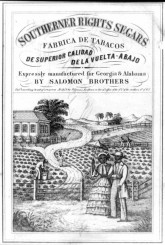What is the impact of the Confiscation Act of 1861?
 August 6, 1861 — Enacted by Congress and signed by President Lincoln today, the Confiscation Act of 1861 stipulated that all property (including slaves) “used or employed, in aiding, abetting, or promoting . . . insurrection or resistance to the laws” of the United States “to be lawful subject of prize and capture wherever found; and it shall be the duty of the President of the United States to cause the same to be seized, confiscated, and condemned.”
August 6, 1861 — Enacted by Congress and signed by President Lincoln today, the Confiscation Act of 1861 stipulated that all property (including slaves) “used or employed, in aiding, abetting, or promoting . . . insurrection or resistance to the laws” of the United States “to be lawful subject of prize and capture wherever found; and it shall be the duty of the President of the United States to cause the same to be seized, confiscated, and condemned.”
A significant first step towards universal emancipation, the Act was extremely limited in scope and rife with shortcomings as it affected only slaves who were captured by federal forces or who escaped behind Union lines. Of that group, only slaves whose labor directly aided or abetted the Confederate war effort were considered contraband.
The greatest deficiency in the legislation was that the act left the status of the contrabands in limbo. Some Union military commanders were discouraged from trying to enforce the law due to legal hassles inherent in determining whether fugitive slaves had directly aided or abetted the Confederate cause. Other officers chose to ignore it because they were not sympathetic to emancipation — or because they didn’t welcome the added burden of caring for thousands of contrabands while trying to wage war.
While this legislation stopped short of explicit emancipation, a succession of further executive orders and constitutional amendments legally cemented the rights of all former slaves in the US.
Sources
Words of Wisdom
We are happy to believe — indeed, we have very good evidence to the fact — the Administration in Washington notwithstanding appearances, stand ready to inaugurate and carry out a policy towards slavery which will most certainly eventuate in breaking down slavery in all the rebel States, just as soon as the people require it.





